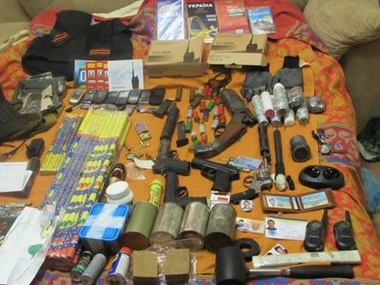
Ukrainian Security Services Arrest Pro-Russia Cossack Cell in Odesa
Publication: Eurasia Daily Monitor Volume: 16 Issue: 93
By:

On May 28, the Security Service of Ukraine (SSU) arrested three Ukrainian citizens who staged an explosion in the lobby of a resort hotel in the major Black Sea port city of Odesa. The suspects were allegedly also planning to launch another terrorist act. Reportedly, the activists, led by 40-year old “M.” (full name not released to the media), were members of the organization Orthodox Cossacks. The SSU press service issued a statement claiming that “it has been established that the terrorist group planned to thwart the presidential elections [held on March 31 (first round) and April 21 (second round)] in Ukraine and further destabilize the situation in the [Odesa] region, for which it was preparing a series of powerful explosions in concentrated public places and in particular, near Odesa state institutions.” The SSU further asserted that the plotters received $10,000 to support such attacks, although it provided no indication of where the money had come from. The Cossacks put up armed resistance as police tried to apprehend them, and later searches by law enforcement revealed a cache of light arms on their property. This was not the first planned terrorist attack in Odesa in recent weeks. On May 19, the SSU reported it had detained three Ukrainians and one Belarusian citizen for allegedly organizing an explosion at an anti-Maidan rally on Kulikovo Field (Gordonua.com, June 8). While presumably the latter were members of a pro- rather than anti-Ukrainian Cossack group, both cases highlight the importance of Cossack paramilitary cells in the ongoing security situation in Ukraine.
While nearly all Cossack hosts claim allegiance to the Christian Orthodox Church, they are split between those who follow the Moscow Patriarchate (pro-Russian Cossacks) and those who follow the Kyivan Patriarchate (pro-Ukrainian Cossacks). Pro-Russian Cossack groups in Ukraine have long been considered agents of Kremlin influence, with suspicions that the Russian special forces finance their activities. Notably, during Russia’s forced annexation of Crimea in 2014, Cossacks from Krasnodar Krai arrived to the peninsula and acted as a police force. Similarly, a Cossack from the Crimean branch of the Zaporozhian Voiska, Sergei Yurchenko, was a member of the Union of Donbas Volunteers and fought in Luhansk oblast against Kyiv-controlled forces before being arrested by the Ukrainian Security Service in 2014 (Tat’iana Derkach, “Moskovskii Patriarxat V Ukraine: Anatomiia Predatel’stva” 2018: 146–147).
On the pro-Ukrainian side, for years there were so many Cossack organizations that there was near complete disunity among them. That changed during the EuroMaidan Revolution (a.k.a., the Revolution of Dignity) in 2013/2014, when Ukrainian Cossacks stepped in to protect the protestors from riot police and provided them with cooked meals. In February 2014, Cossacks from Zaporozhia traveled to Kyiv to join the main protest. In March 2014, when Russian-backed groups began openly advocating for secession from Ukraine, Cossacks in Zaporozhia were among the main defenders of regional state institutions (Pravda.com.ua, March 18, 2014). One of the self-identified Cossacks who was forced to strip in the middle of winter by then-president Viktor Yanukovych’s Berkut riot police after appearing in protests on the Maidan, Mikailo Gavrilyuk, later won a seat in the parliament (Reuters, November 28, 2014).
One of the most infamous pro-Russian Cossack movements in Ukraine is known as “Faithful Cossacks.” The organization was ostensibly created to promote “shared” Russian, Ukrainian, Belarusian and, somewhat ambiguously, “Orthodox” values, which apparently include attacking LGBT rights. In August 2016, the Faithful Cossacks arranged a children’s summer camp, in the woods near Kyiv, where participating children were instructed in knife-fighting, shooting, paintballing, and battle tactics. According to state investigators, the goal was the creation of a fifth column to aid in destabilizing the situation inside Ukraine when called upon. Yevgeny Karas, a fighter in Donbas against the joint Russian-separatist forces, argued that the Faithful Cossacks “is a long-standing pro-Russian public organization. In Ukraine, they are engaged in diverse activities. On the one hand, it is youth training in pro-Russian camps, that is, where they hang the [white-blue -red] tricolor and conduct public activities.” The leader of this Cossack organization, ataman Alexei Salianov, from Kyiv, declared that “our teachings are devoted to the anniversary of the liberation of Russia from the Poles in 1612 and the anniversary of the liberation of our homeland in 1812. Our ancestors showed they are real warriors and brave fighters, not dependent on weather conditions and the state of their health. Today we have to repeat that.” Selianov himself volunteered to assist Yanukovych’s security forces during the 2014 Maidan operation and later fled to Donbas following the success of the pro-democracy protestors. He eventually took a job with the Ministry of Internal Affairs of the self-proclaimed “Luhansk People’s Republic” (Hromadske.ua, October 20, 2016).
Post-Soviet Cossacks—a multifaceted identity grouping that has so far not managed to claim recognition anywhere as a separate ethnic group—is in many ways a microcosm of the broader Russia-Ukraine conflict, where political loyalties divide organizations and the broader culture itself (Richard Arnold, “Whose Cossacks Are They Anyway?” PONARS Eurasia, January 2019). And in exploiting various Cossack groups to achieve its political goals in Ukraine, Russia pursues another important dimension in its wide-ranging “hybrid war” against Kyiv.



